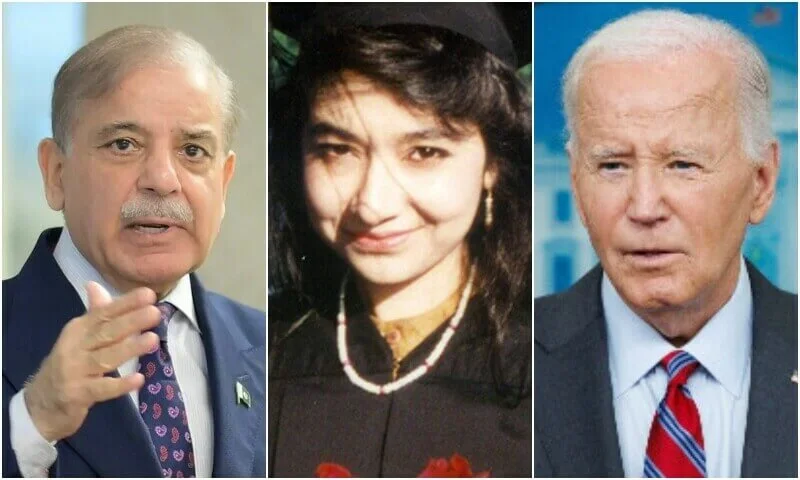Shahbaz Sharif, the prime minister of Pakistan, has formally asked US President Joe Biden to pardon Dr. Aafia Siddiqui, a citizen of Pakistan who is incarcerated in the US for 86 years. Concerns over her declining physical and mental health following 16 years in prison are intensifying, which is why she is filing the appeal.
Key Points of PM’s Clemency Appeal
- Letter dated October 13 emphasizes Dr. Siddiqui’s “fragile mental and frail physical health”
- Highlights concerns raised by Pakistani consular officials about her treatment
- Appeals to Biden’s track record of advocating for US citizens held abroad
- Requests clemency on strictly humanitarian grounds
Background of the Case and Clemency Request
Dr. Siddiqui, now 52, was convicted in 2010 by a US federal court in Manhattan on multiple charges, including:
- Attempting to shoot US military officers while in custody
- Possession of sodium cyanide (allegedly two kilos hidden in moisturizer bottles)
- Six other related charges
The incident happened in 2008 while she was being held in Afghanistan by US military. Court records claim that while being questioned, she allegedly reached for a rifle and started shooting at US officials while yelling anti-American statements. Despite the fact that no US servicemen were hurt in the incident, Dr. Siddiqui was hurt, which ultimately led to her conviction. Her medical and mental well-being are now the main points of the clemency plea, along with a humanitarian one for her release.
Recent Developments in the Clemency Petition
A significant breakthrough occurred on October 9 when:
- A US judge granted Dr. Siddiqui’s legal team access to new confidential evidence
- This evidence could potentially strengthen her clemency petition
- Attorney Clive Stafford Smith submitted a comprehensive 56,600-word clemency petition
Prime Minister’s Diplomatic Approach for Clemency
In his letter, PM Shahbaz emphasized several diplomatic points in support of the clemency appeal:
- Acknowledged Biden as a “committed friend of Pakistan”
- Highlighted the PM’s duty to ensure Pakistani citizens’ wellbeing
- Referenced Biden’s understanding of protecting citizens abroad
- Stressed the humanitarian nature of the clemency request
Concerns Over Mental Health and Urgency of Clemency
The letter particularly emphasized the urgent nature of the clemency appeal, noting that:
- Pakistani officials who visited her expressed serious concerns about her treatment
- There are fears she might attempt self-harm
- Her current physical and mental condition requires immediate attention, further justifying the request for clemency
The gravity of this clemency request in Pakistan-US relations is reflected in the fact that it is one of the highest-level diplomatic interventions in Dr. Siddiqui’s case. The emphasis on humanitarian concerns as opposed to legal justifications points to a calculated strategy for obtaining her release through diplomatic channels and mercy.
Since Dr. Siddiqui’s case has long been a contentious topic in diplomatic negotiations between the two countries, the outcome of this clemency plea could have a substantial impact on bilateral relations between Pakistan and the United States.

